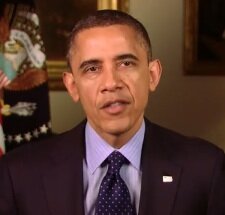By Bruce Reed, Chief of Staff to Vice President Biden
In the days since the tragedy in Newtown, Americans from all over the country have called for action to deter mass shootings and reduce gun violence. Hundreds of thousands of you have signed petitions on We the People.I’m writing you today to thank you for speaking up, to update you on an important development, and to encourage you to continue engaging with the White House on this critical issue.
First, you should know that President Obama is paying close to attention to the public response to this tragedy. In fact, he sat down to record a message specifically for those of you who have joined the conversation using We the People. Watch it now:

On Wednesday, the President outlined a series of first steps we can take to begin the work of ending this cycle of violence. This is what he said:
We know this is a complex issue that stirs deeply held passions and political divides. And as I said on Sunday night, there’s no law or set of laws that can prevent every senseless act of violence in our society. We’re going to need to work on making access to mental health care at least as easy as access to a gun. We’re going to need to look more closely at a culture that all too often glorifies guns and violence. And any actions we must take must begin inside the home and inside our hearts.
But the fact that this problem is complex can no longer be an excuse for doing nothing. The fact that we can’t prevent every act of violence doesn’t mean we can’t steadily reduce the violence, and prevent the very worst violence.
Vice President Biden has been asked to work with members of the Administration, Congress, and the general public to come up with a set of concrete policy proposals by next month — proposals the President intends to push swiftly. The President asked the Vice President to lead this effort in part because he wrote and passed the 1994 Crime Bill that helped law enforcement bring down the rate of violent crime in America. That bill included the assault weapons ban, which expired in 2004.
As the Vice President’s Chief of Staff, I’m going to do everything I can to ensure we run a process that includes perspectives from all sides of the issue, which is why I wanted to respond to your petition myself. Two decades ago, as domestic policy adviser in the Clinton White House, I first worked with Joe Biden as he fought to enact the Crime Bill, the assault weapons ban, and the Brady Bill. I will never forget what a key role the voices of concerned citizens like you played in that vital process.
The President called on Congress to pass important legislation “banning the sale of military-style assault weapons,” “banning the sale of high-capacity ammunition clips,” and “requiring background checks before all gun purchases, so that criminals can’t take advantage of legal loopholes to buy a gun from somebody who won’t take the responsibility of doing a background check at all.”
An issue this serious and complex isn’t going to be resolved with a single legislative proposal or policy prescription. And let’s be clear, any action we take will respect the Second Amendment. As the President said:
Look, like the majority of Americans, I believe that the Second Amendment guarantees an individual right to bear arms. This country has a strong tradition of gun ownership that’s been handed down from generation to generation. Obviously across the country there are regional differences. There are differences between how people feel in urban areas and rural areas. And the fact is the vast majority of gun owners in America are responsible — they buy their guns legally and they use them safely, whether for hunting or sport shooting, collection or protection.
But you know what, I am also betting that the majority — the vast majority — of responsible, law-abiding gun owners would be some of the first to say that we should be able to keep an irresponsible, law-breaking few from buying a weapon of war. I’m willing to bet that they don’t think that using a gun and using common sense are incompatible ideas — that an unbalanced man shouldn’t be able to get his hands on a military-style assault rifle so easily; that in this age of technology, we should be able to check someone’s criminal records before he or she can check out at a gun show; that if we work harder to keep guns out of the hands of dangerous people, there would be fewer atrocities like the one in Newtown — or any of the lesser-known tragedies that visit small towns and big cities all across America every day.
The President said it best: “Ultimately if this effort is to succeed it’s going to require the help of the American people — it’s going to require all of you. If we’re going to change things, it’s going to take a wave of Americans — mothers and fathers, daughters and sons, pastors, law enforcement, mental health professionals — and, yes, gun owners — standing up and saying ‘enough’ on behalf of our kids.”
So let’s continue this conversation and get something meaningful done. If you have additional ideas and are interested in further engagement with the White House on this issue, please let us know and share your thoughts here:
http://www.whitehouse.gov/share-your-thoughts-reducing-gun-violence
Thank you for speaking out and staying involved.

